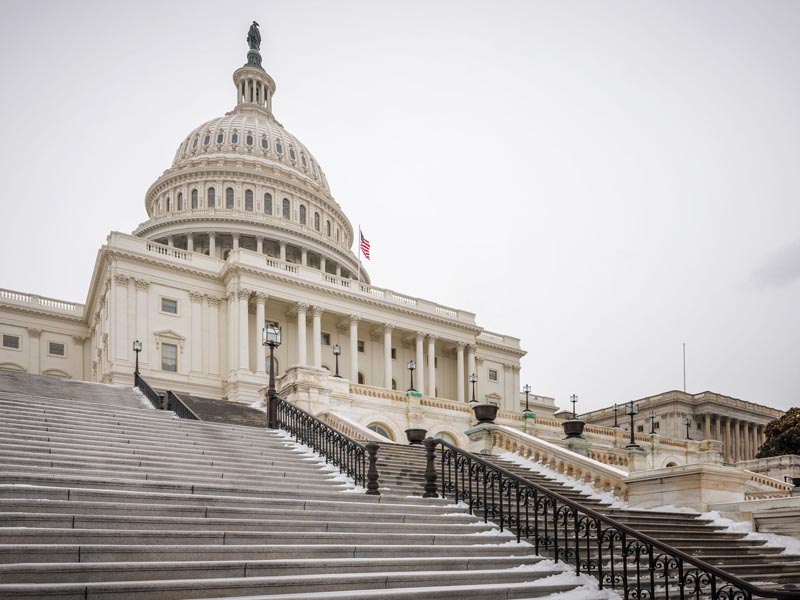AAFP Highlights Primary Care in Rescue Package Needs
Pay Parity, Workforce Priorities Among Key Academy Asks
February 15, 2021, 3:15 pm News Staff — In a Feb. 10 letter to congressional committee leaders, the AAFP called for legislative action to bolster primary care and improve Americans’ access to it. The recommended measures, wrote the Academy, are in close alignment with the Biden administration’s COVID-19 stimulus and recovery plan.

“The American Rescue Plan calls for significant investment in COVID-19 vaccinations, testing and treatments. Primary care is a critical gateway to all of these,” the letter said. “Additionally, primary care physicians are among the most trusted advisers for vaccine decisions and will be critical in combatting COVID-19 vaccine hesitancy and ensuring equitable vaccination.”
The letter, signed by AAFP Board Chair Gary LeRoy, M.D., of Dayton, Ohio, was addressed to the chairs and ranking members of the Finance; Health, Education, Labor and Pensions; Ways and Means; and Energy and Commerce committees. Following the announcement that the American Rescue Plan would commence via budget reconciliation, these and other committees have been working on the legislation that will make up the $1.9 trillion package.
Echoing recent recommendations sent to the White House and Congress, the Academy’s letter urged lawmakers to strengthen primary care by concentrating on three key issues.
Medicaid Payment
“The AAFP urges Congress to pass legislation to raise Medicaid payment rates for primary care services to at least Medicare rates,” the Academy wrote. The Ensuring Access to Primary Care for Women and Children Act of 2020, which the AAFP supported when it was introduced in the last Congress, would do this.
Story Highlights
“Inadequate Medicaid reimbursement makes it more challenging for primary care physicians to accept more Medicaid patients and threatens the viability of practices serving areas with a higher proportion of Medicaid coverage,” the Academy said.
And while enrollment in Medicaid and the Children’s Health Insurance Program during the pandemic have increased by more than 6 million people — in turn increasing the demand for primary care — Medicaid, on average, pays just 66% of the Medicare rate for primary care services (and can be as low as 33% in some states). “This payment disparity is exacerbating the financial and workforce instability that primary care practices are facing due to COVID-19,” the letter added.
Primary Care Workforce
The package also should incorporate the Strengthening America’s Health Care Readiness Act, the Academy said, repeating its recent support of that legislation. It would increase National Health Service Corps funding and help to diversify the physician pipeline.
In tandem with that should come increased investment in the Teaching Health Center Graduate Medical Education program, the letter added, to increase the number of primary care physicians trained and working in rural and underserved areas.
Shoring up the NHSC and the THCGME program would support the American Rescue Plan’s proposed boost to community health centers and expanded health workforce, the Academy said. “CHCs are an important primary care access point for low-income, minority and other underserved populations. However, CHCs have historically struggled to meet physician workforce demands, and recruitment and retention of family physicians — the most common type of CHC clinician — is one of the greatest needs.”
Relief for HDHP Enrollees
To help alleviate cost barriers to care and avoid worsening access disparities for the many Americans now relying on high-deductible health plans, the Academy wrote, “Congress should pass legislation to allow HDHPs to waive the deductible for critical primary care services.”
Noting that last year’s Coronavirus Aid, Relief and Economic Security Act allowed HDHPs to temporarily waive deductibles for telehealth services, the Academy reminded lawmakers that “not all health care needs can be met virtually, and patients need comprehensive primary care to navigate the pandemic.”
The AAFP is working with members of Congress to introduce legislation addressing this and related issues. Last year the Academy advocated for passage of a bill to eliminate deductibles for outpatient pediatric care and has lobbied for legislation allowing two no-cost primary care visits a year for HDHP enrollees.